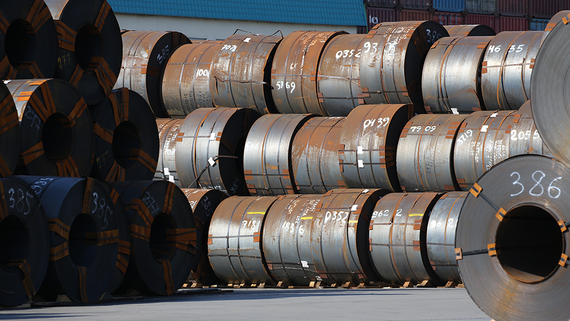How do importers of steel products in the EU prove non-Russian semi-finished products
[ad_1]

Companies and traders importing steel products to the EU will have to provide evidence that the goods were not produced from Russian semi-finished products. The corresponding requirement is contained in the 11 package of EU anti-Russian sanctions, adopted on June 22.
Brussels introduced a ban on the import of steel products made from Russian semi-finished products as early as the eighth package of sanctions at the beginning of October 2022. So, if steel products are made from Russian square billet (semi-finished product for rebar), it cannot be imported into the EU from April 1, 2024 If the product is made from Russian slab (semi-finished product for flat products), it cannot be imported into the EU from October 1, 2024.
The list of steel products affected by the measures includes a wide range of flat and section steel products, as well as pipes. If other types of semi-finished products are used in the manufacture of steel products imported into the EU – other than square billets or slabs, the customs codes of which are indicated in the text of the package of sanctions – the restriction begins to apply as early as September 30, 2023. From April and October 2024, a ban on import, respectively, of the square billets and slabs themselves from Russia to the EU, and before that they can be imported in the volumes of quotas determined by the sanctions.
Now, with the 11th package, a new condition has been added to these measures. According to a text published in the Official Journal of the EU, during the customs clearance process, importers will be required to “provide proof of the country of origin of steel semi-finished products processed in a third country.”
According to a source in one of the Russian metallurgical companies, earlier, apart from the ban on the import of steel products from Russian semi-finished products, the documents did not contain a control mechanism, that is, compliance with sanctions was farmed out to suppliers. “Now the EU authorities have decided not to rely on their good faith and have introduced the need to provide documents of the origin of the materials from which imported products are made,” he says.
But in fact, most companies are reinsured due to secondary sanctions, the source says. Thus, additional requirements on the need to prove the origin of raw materials will not have a significant impact on the situation, he concludes.
“I don’t think that the need to prove the origin of the semi-finished products from which the steel products imported to the EU are made will greatly affect the import of processed Russian steel – it is not so easy to prove it. So the announced measure is more of a political gesture,” the international trader believes.
According to him, in general, the ban on imports to the EU of products from Russian steel semi-finished products will have the greatest impact on Turkey. In addition, the new requirements may affect Egypt and the Middle East, he argues. Asia, these measures affect to a lesser extent, the trader concludes.
Dmitry Smolin, a senior analyst at Sinara investment bank, believes that the requirement for suppliers of steel products to the EU to prove that they are not made from Russian semi-finished products will increase the bureaucracy of importing these goods to the EU. It will be necessary to introduce standard forms, create a system for checking what is written in them, the expert lists. “And it’s not a fact that this system will work,” Smolin concludes.
According to Sergey Glandin, a partner at BGP Litigation, a specialist in sanctions law, in the EU, as in Russia, there is such a type of customs document as a certificate of origin. “Most likely, it will be used to prove that the imported steel products are not made from Russian semi-finished products,” the expert suggests.
Glandin emphasizes that the EU is dominated by such a concept as “overcompliance” (excessive compliance. – “Vedomosti”) and there are administrative and criminal liability for violation of customs laws. “So, at the slightest doubt, the deal will not go through, and no one in the EU will engage in this abuse – European business does not take such risks, even if it can gain something from this in the short term,” concludes the lawyer.
[ad_2]
Source link





